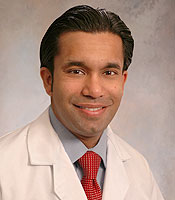Introduction
The Interventional Cardiology training program at the University of Chicago has been in existence formally since 1999, the first year that the ACGME identified Interventional cardiology as a distinct discipline. Each year, the program trains 1 or 2 fellows as part of its accredited program, having trained 31 fellows since 1999.

Interventional Cardiology, Program Director
The training program is only open to cardiologists who have completed a three year ACGME-accredited cardiology fellowship program. At the completion of the 12-month interventional cardiology fellowship, it is expected that the trainee will have the procedural volume, technical skills and cognitive knowledge base to pass the ABIM Added Qualification Examination in Interventional Cardiology. The guidelines for training are based on the ACC Clinical Competence Statement “Recommendations for the Assessment and Maintenance of Proficiency in Coronary Interventional Procedures” (1998), and the American College of Cardiology Training Statement on Recommendations for the Structure of an Optimal Adult Interventional Cardiology Training Program (1999). Additional information is available in the document: ACGME Program Requirements for Graduate Medical Education in Interventional Cardiology (Internal Medicine).
Expectations
The Interventional Cardiology Training Program has as its primary goal to train the fellow to be qualified to independently perform coronary interventions involving various devices and modalities at a level of proficiency to provide the highest quality of interventional care. Additional proficiency in peripheral vascular and structural heart interventions will also be obtained by the trainee over the course of the fellowship.
How to Apply
Applications are handled through the Electronic Residency Application Service (ERAS) provided by the Association of the American Medical Colleges (AAMC). Applications must be eligible for certification in Cardiovascular Disease by the American Board of Internal Medicine and must be licensed by the State of Illinois at the time they begin their fellowship.
Required Application Materials:
- Complete ERAS application
- Personal Statement
- Curriculum Vitae
- 3 letters of recommendation
- Photo
Application Deadlines:
July 1st: ERAS Cycles open to applicants
August 31st: Application deadline – new applications will not be reviewed after this date
September-October: Interviews scheduled and conducted
Visas:
International Medical Graduates (Graduates of medical schools outside of the United States and Canada)
Visa Requirements:
J1 Visa (preferred): sponsored by the Educational Commission for Foreign Medical Graduates
H-1B Visa: sponsored by the University of Chicago Medicine – Programs assume all financial cost related to the H-1B visa.
If you have additional questions please contact Melissa Meskers, Education Coordinator, at mmeskers1@bsd.uchicago.edu.
